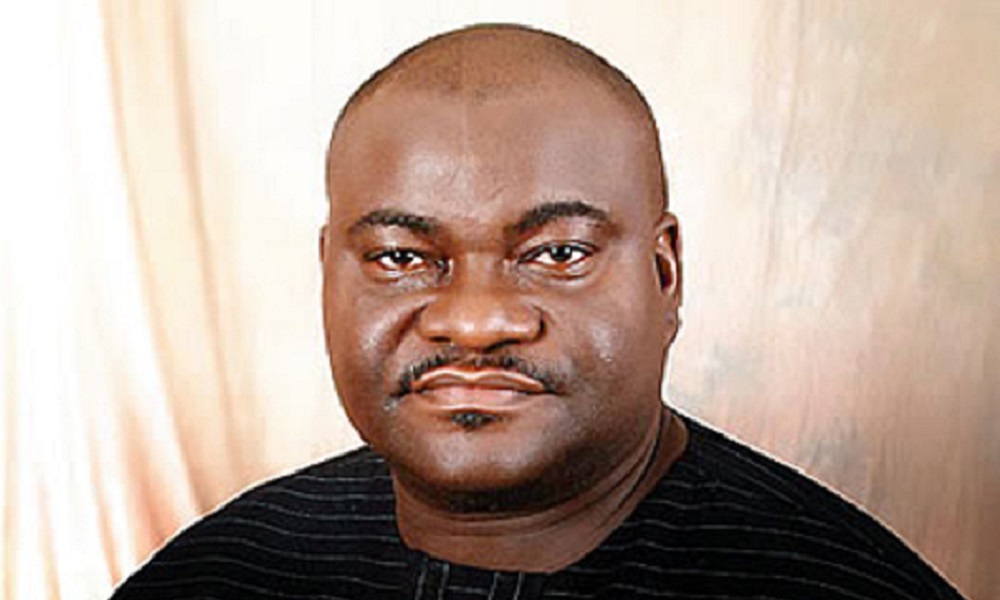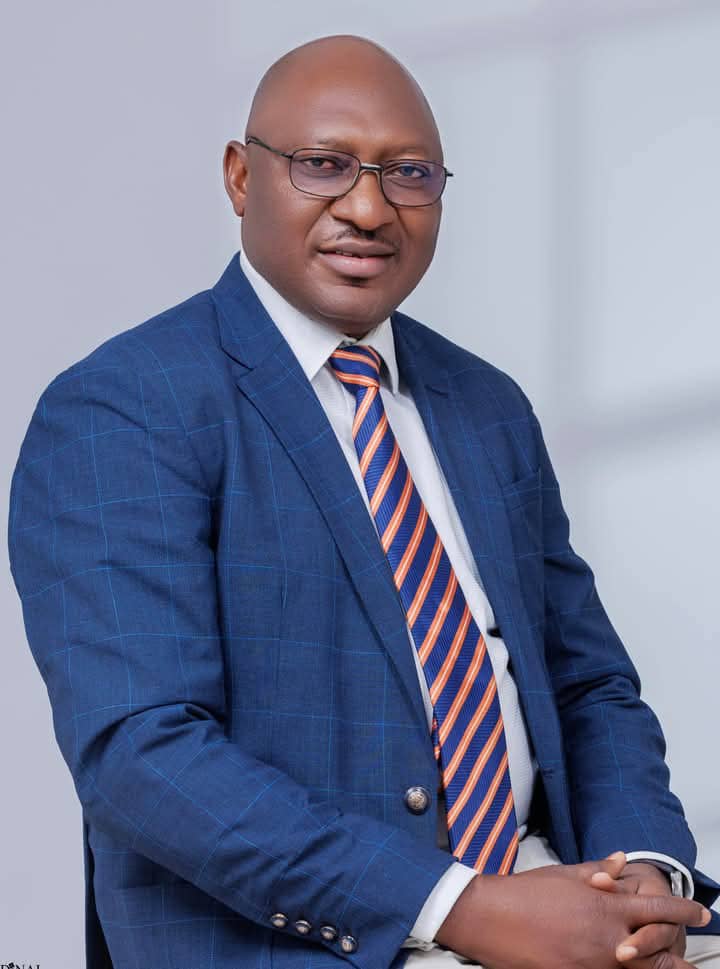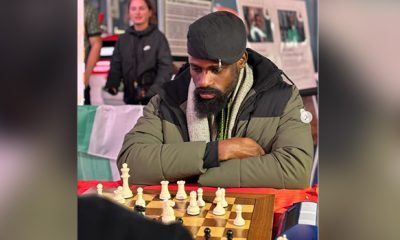Opinion
KARIMI AND THE REALITY OF OUR COLLECTIVE VULNERABILITY

By Tunde Olusunle
Commuters on the “Trunk A Road” as it was labelled, traversing Kabba-Aiyetoro Gbedde-Mopa-Isanlu-Egbe communities in Kogi State must have observed frenetic construction activities at the Egbe section of the road abutting Kwara State. I’m told vehicular movement is infrequent these days because of the decrepit condition of the road, its attendant loneliness and its susceptibility to the murderers rascality of criminals. Travellers to parts of Kwara, Oyo and Osun, from parts of the North notably Nasarawa, Benue, Kogi and the Federal Capital Territory, (FCT) these days, prefer the Kabba-Omuo Ekiti road which is marginally less degenerate. Okun-Yoruba people domiciled in their traditional abodes desiring to conduct business in contemporary Kwara State to which they once belonged, however, are left with no option but to ply the road under discussion. For them it will be easier to catch glimpses of ongoing construction in the area I previously alluded to.
There is a signpost with the inscription *Ido Egbe* in the part of the expansive Egbe community where the said development is proceeding. A luminous perimeter fence covers the generous hectarage being developed at the said site. One particular structure rises sky high above the several others all capped with lemon-green aluminium roofing. The buildings vary in shape and size even as they are at various stages of completion. A long vehicle rests around the ongoing development, obviously one of many others feeding the project with its needs. You cannot but ask yourself whether the complex is a creation of the federal or state government, or a private investor desirous of doing business in the community. Or could it be a model residential estate?
The project under reference is a *Military Foreward Operating Base, (FOB),* being developed by Sunday Karimi, the Senator representing Kogi West Senatorial Zone. Over the years, parts of the district have come under premeditated attack by armed robbers, kidnappers and unfeeling herdsmen. At various times, cold-blooded robbers have attacked banks operating in several communities in the zone. In every instance, they left behind a trail of crimson blood, sorrow and tears. From Kabba to Aiyetoro-Gbedde to Isanlu, to Odo-Ere and Egbe in Kogi West, the pattern of the hoodlums have been pretty much the same. They launch surprise attacks on the police stations in each community. They thus neutralise the capacity of the law enforcement agents to engage them when they eventually swoop on their major targets, the banks.
First Bank, Mainstreet Bank, United Bank for Africa, (UBA) and Access Bank at various times have been robbed by the hoodlums, during banking hours. The callousness of the nonessentials was so grave on every occasion that it spiralled down the subsistence economy of the locals. The banks shut down for long spells ostensibly to rethink their continuing operation or not in the district vis-a-vis the losses they incurred. They equally evaluated the costs of rebuilding decimated structures and facilities in each instance relative to whatever fiscal trickles they earned, juxtaposed with the costs of providing services to their predominantly low income customers. We are talking about farmers, small scale entrepreneurs, school teachers and local government employees mainly.
More recently, kidnapping for ransom a trend hitherto heard about from very distant ecologies, has become another dimension of criminal pastimes by faceless groups. Sleepy communities in Yagba East and Yagba West local government areas basking in their rustic innocence and quietude, have been rudely violated by harbingers of grief and lachrymose. In January this year, six people were kidnapped within a space of 48 hours, around Isanlu, headquarters of Yagba East. Three of them lost their lives trying to escape from their abductors. Two women were picked up from Ejiba in Yagba West last May, by a gang of one dozen gun-toting brigands. Okunland which previously epitomised the purest innocence, calmness, serenity and safety, has been grievously intruded upon. This is not forgetting the impudence and insult of having irreverent Fulani nomads marching their herds through our farmlands destroying the subsistence investments of the people.
As a fairly regular visitor to my home community for sundry events and programmes, I’ve often been very concerned about the inadequacy of the capacity of security operatives at the local levels. I speak here about insufficient personnel and armament wherewithal in our localities. Isanlu for instance is the headquarters of Yagba federal constituency which aggregates Yagba East, Yagba West and Mopamuro local governments. It is host to the area command of the police and oversees the three local government areas in question. I will be amazed, however, if there are up to 150 officers and men, or half that number of serviceable armaments in the armoury of the area command. I had reason to request for police cover for a family event we hosted about six years ago. The police apologetically replied and alluded to the inadequacy of manpower. I resorted to the Nigerian Security and Civil Defence Corps, (NSCDC) as backup plan. I was told straight up that the entirety of my local government area was served by 15 civil defence personnel.
Critically, I was informed that most of the men had indeed been taken up by traditional rulers in our parts. The kings as it were desire that their royalty be heralded at every stop, courtesy of state uniform-wearing operatives functioning as human furniture, who sit on the front seats of their vehicles The royalties resorted to civil defence staff in the absence of police personnel to serve in as orderlies. Such are the confounding statistics and realities of the security architecture in our sub-urban communities. Let’s be reminded that hoodlums perfect their operational strategies before they take on a target, institution or community. This of course includes distilling the prevailing personnel and armament strengths of their targets. This explains why police stations in rural communities are almost always first targets where security personnel are neutralised and the armouries accessed and looted to strengthen their own capacities.
Against the backdrop of such embarrassing and condemnable state failure at the very centre to protect and secure its citizens, this very basic constitutionally non-negotiable responsibility has had to be taken up not by subregionals, but private individuals. This is the new normal as we find in the example under interrogation. One has heard elsewhere of privileged Nigerians or organisations partnering security and intelligence services in the provision of operational needs and infrastructure. The *Military Forward Operating Base* in Egbe, however, is one hundred percent privately funded by Sunday Karimi. He has taken a broader view of the concerns of his people, with the aim of assuaging their overwhelming security worries. It is definitely a tall and ambitious project daring to conceive and build from foundation, a complex which can probably pass as a modern military barracks, but Karimi has confronted the challenge headlong.
The “Foreward Operating Base” project under review is without doubts a visionary concept. It has the “observatory,” the tall structure which dwarfs the rooftops in the upcoming premises, where soldiers on guard duties will get a good view of the area and sensitise ground troops in the event of a possible threat. There is a security post and a mini-administrative block. There are also two blocks of 12 rooms each all ensuite, which come to 24 rooms for the “rank and file,” the junior officers. Boreholes have been drilled and will pump water to overhead tanks which will service the facilities and premises, downstream. Two units of three bedroom bungalows are provided for officers, while there is also rendezvous spot, an “officer’s mess” as is tradition with the military. Hopefully, a skeletal “mammy market” for the junior officers will spawn when the facility in its wholeness is operationalised.
Expectedly, Karimi has either engaged with the military high command for the adequate manning of the facility, or has prioritised this now that the Egbe project is nearing completion. This again is part of the systemic dysfunction consuming our nation and we the citizenry. Why should government departments have to be begged and lobbied to do their jobs? This again beggars the question of either unthinkable complacency or pure lack of capacity in statecraft. On account of his present effort in helping to secure the lives and belongings of his people, Karimi deserves our collective applause. Like Leke Abejide his colleague in the House of Representatives who has championed impactful causes for his people, Karimi in this instance, has chosen to deviate from the despicable practice by some of our representatives, who have gleefully weaponised poverty. These are the mindless politicians who waylay our hapless rural folks with sachets of salt and packets of pasta on polls day.
*Tunde Olusunle, PhD, is a Fellow of the Association of Nigerian Authors, (FANA)*
Opinion
Hon. Prof Nnamchi’s Low Social Media Presence Doesn’t Define His Output- A Reply To X User’s Observation

By Titus Agbo
A user on X, formerly Twitter, named Mechelito@Onyema_7, claimed that Hon. Professor Paul Sunday Nnamchi, the member representing of Enugu East/Isi Uzo Federal Constituency in the House of Representatives doesn’t post about the insecurity issues in Eha-Amufu and his efforts to impact his constituents on his X handle, @sunday_nnamchi. The user supported his claim with a screenshot of Nnamchi’s X account page.
However, it’s worth noting that Professor Nnamchi’s low online presence doesn’t necessarily reflect his efforts and output. He was raised by Catholic priests and has a humble disposition. Before venturing into politics, he was involved in humanism, providing free computer training to students in his local government area, Enugu East. This initiative, which aims to expose students to information and communication technology (ICT) education, has trained over 2,000 students as he has since expanded it to accommodate his constituents from Isi Uzo immediately he was elected into the National Assembly.
# Key Achievements
-Scholarships*: Nnamchi has offered scholarships to hundreds of indigent students from various communities within the constituency, including non-indigenes residing in Enugu East/Isi Uzo. Sewed school uniforms for pupils in primary schools and facilitated employments for a few constituents.
– *Infrastructure Development*: He deployed ₦300 million worth of solar-powered streetlights to communities in Enugu East Local Government Area last year and plans to replicate same in Isi Uzo this 2025.
– *Education and Healthcare*: Nnamchi has built and renovated classroom blocks, provided medical outreach programs, and offered free medical treatments and medications to constituents who couldn’t afford them.
– *Security*: He raised a motion on the Eha-Amufu killings on the floor of the House of Representatives on the 19th December, 2023 prompting the House to urge the Inspector-General of Police and the Chief of Army Staff to deploy adequate security personnel to Eha-Amufu and also directed the National Emergency Management Agency, (NEMA) to provide relief materials to the affected victims.
Professor Nnamchi also issued a strongly worded press statement in December 2024 reminding the relevant security agencies of the need to step up their operations in Eha-Amufu. The motion and the subsequent press statement issued the following year when the hoodlums struck again in 2024 were widely reported by both online and major newspapers as can be observed with a few examples of the publications below.
– “Lawmakers Seek Urgent Action To Address Insecurity In Enugu State” by Gloria Essien, Abuja (Voice of Nigeria online, December 4, 2024)
– “Enugu attacks: Reps urge FG to intensify efforts against insecurity in S/E” (Vanguard Newspaper, December 4, 2024)
– “Task FG to address insecurity in South East” by Ndubisi Orji (Sun Newspaper, December 5, 2024).
Nnamchi has sponsored 36 establishment and amendment Bills and numerous motions as at March 2025. The Order Paper, an authoritative in-house journal of the National Assembly, adjudged him the most performing legislator from the Southeast in 2024 ¹.
I want to assure the above X user that all Hon Professor Nnamchi’s social media accounts will be put into proper use henceforth to keep constituents like him updated with Professor Nnamchi’s legislative and constituency engagements.
Titus Agbo, a public affairs analyst wrote from Enugu
Opinion
5G,IoT and AI to boost global GDP by 2030

By Sonny Aragba-Akpore
With Mobile technologies and services now generating around 5.8% of global Gross Domestic Product (GDP) a contribution that amounts to about $6.5 trillion of economic value, there are strong projections that by 2030, this figure will rise to almost $11 trillion, or 8.4% of GDP.
Global System of Mobile Communications Association (GSMA) says much of this will be driven by countries around the world increasingly benefiting from the improvements in productivity and efficiency brought about by the increased take-up of mobile services and digital technologies, including 5G, Internet of Things (IoT) and Artificial Intelligence (AI).
The GSMA recently introduced the 5G Connectivity Index to provide insights into 5G performance in 39 markets in order to encourage informed decision-making.
In terms of Economic Impact,
the GSMA emphasizes the economic benefits of mobile technologies and services, including 5G, projecting that they will contribute significantly to GDP growth by 2030.
“The GSMA provides specific reports and analyses on 5G in different regions, such as Sub-Saharan Africa, Asia ,Middle East among others highlighting the progress and challenges of 5G deployment in specific areas.”
In Sub Saharan Africa for instance with particular attention on Nigeria,South Africa,Egypt,Kenya and Botswana among others some measure of progress in deployment has been recorded.
The rollout of 5G has brought immense benefits across multiple industry sectors, particularly those involving internet of things (IoT) and artificial intelligence (AI) applications in which the real-time transfer of data is crucial.
More broadly, the adoption of 5G is expected to accompany increased data use across the globe, with forecasts anticipating mobile data traffic of over 300 exabytes per month by 2030, more than twice the volume consumed in 2024 according to Statista.
And with a third of global population expected to be covered by this fifth generation (5G) networks ,a technology that has defined new ways of communication by 2025 ,GSMA
says the technology has surpassed growth projections of all times.
“5G subscriptions increased by 163 million during the third quarter 2024 to total 2.1 billion. 5G subscriptions reached close to 2.3 billion by the end of 2024 accounting for more than 25 percent of all global mobile subscriptions.
“4G subscriptions continue to decline as subscribers migrate to 5G” according to GSMA.
As of the first quarter of 2024, there were nearly two billion 5G connections worldwide, with 185 million new additions. This is expected to grow to 7.7 billion by 2028.”
Statistics show that 5G is the fastest-growing mobile broadband technology, reaching 1.5 billion connections by the end of 2023.
It only took four years to reach this number, compared to 10 years for 3G and more than five years for 4G.
“5G is more than a new generation of technologies; it denotes a new era in which connectivity will become increasingly fluid and flexible.5G Networks will adapt to applications and performance will be tailored precisely to the needs of the user” GSMA submits.
By covering one-third of the world’s population , impact on the mobile industry and its customers will be profound according to GSMA.
To deepen the spread of 5G ,GSMA is working closely with the mobile operators pioneering 5G, “by engaging with governments, vertical industries including automotive, financial services, healthcare providers, transport operators, utilities and other industry sectors to develop business cases for 5G.”
And In order to accelerate the growth and spread, many operators are said to be deploying
AI technology as part of an integral part of telecoms operators’ strategic and operational plans.
“Operators are making important advancements in the deployment of AI technology, which is serving as a transformative force shaping the telecoms industry. By deploying autonomous AI-based systems, operators can enhance operational efficiency, customer satisfaction and security, while also creating new revenue opportunities”.
China, South Korea, the United Kingdom, Germany, and the United States are the leading countries with robust 5G coverage in the world.
Since the first commercial launches of the fifth generation of mobile networks in late 2018, these five countries have emerged as leaders because multiple companies in these countries have deployed networks and are selling compatible devices. Countries including Switzerland and Finland are up and comers in 5G development, though they have limited deployment.
In China there are three Companies leading in deployment.
The world’s largest 5G network was launched by the three largest Chinese network operators Oct 31, 2019, according to the state-run news agency Xinhua. These are China Mobile, China Unicom, and China Telecom which all activated their networks in less than five months after they were issued 5G licenses.
Each of the network operators offered their 5G services at $18 per month in 50 Chinese cities at the beginning of the launch.
GSMA expects 36% of China’s mobile users to be using 5G by 2025. That’s about 600 million subscribers, who would also make up 40% of the entire global 5G market by this year.
This is all despite efforts made by the United States government to hamper the progress of Chinese vendors, though those efforts may affect how Chinese companies may expand into the global market.
In South Korea,SK Telecom and Korea Telecom run as the main competitors for the South Korean 5G market.
SK Telecom acquired spectrum in the 3.5 GHz and 28 GHz frequencies to prepare for deploying 5G.
In April of 2019, the Enterprise claimed to be the first mobile carrier in the world to launch 5G services to work on 5G smartphones. SK Telecom asserted an edge over rival Verizon, as the former launched 5G services available at the same time as Samsung Galaxy S10 5G smartphone launched in South Korea. Verizon launched mobile 5G services in the U.S. before a 5G enabled smartphone was available to U.S. consumers.
SK Telecom also conducted tests with a 5G Standalone (SA) Core (a core not reliant on the 4G network) for their 5G network in cooperation with Samsung Electronics.
The world’s largest 5G network was launched by the three largest Chinese network operators Oct 31, 2019, according to the state-run news agency Xinhua. These are China Mobile, China Unicom, and China Telecom which all activated their networks in less than five months after they were issued 5G licenses. Each of the network operators offered their 5G services at $18 per month in 50 Chinese cities at the beginning of the launch.
“What we are seeing is a concerted effort by the Chinese — the operators, vendors, and government regulators — to deploy 5G as quickly as possible,” Chris Nicoll, principal analyst at ACG Research, pointed this out in a November 1, 2019 SDxCentral article.
With all of these players working together, the three network operators had collectively deployed nearly 86,000 5G base stations peaked over 130,000 by the end of 2019. The latter number breaks down into China Unicom and China telecom, with each planning to install 40,000 base stations, and the market leader China Mobile to install 50,000.This was the projection by 2019 but they have since overshot this by the beginning of 2024.
The International Telecommunication Union (ITU), says 5G coverage reached 40% of the world’s population in 2023 with an uneven coverage and distribution with developed countries having more coverage than low-income countries:
In Europe ,68% of the population is covered and
Americas had 59% of the population covered while
Asia-Pacific has 42% of the population covered as at 2023.
Arab States have 12% of the population covered.
Commonwealth Independent of States (CIS) had 8% of the population covered.
ITU figures show Africa,s coverage rose to 10 % of the population by 2023 .
The ITU also notes that 90% of the world’s population is covered by 4G, but 55% of people without access to 4G live in low-income countries because In low-income countries, 3G is often the only technology available to connect to the Internet.
The ITU develops and adopts international regulations and global standards to enable the harmonization and implementation of broadband mobile networks.
In Africa, around a dozen nations have launched services including Botswana, Kenya, Mauritius, Madagascar, Nigeria, Seychelles, South Africa, Tanzania, Togo, Zimbabwe, and Zambia but Africa is a patchwork of 54 countries.
And penetration is predicted to be slow.
By 2027, Ericsson predicts that 80 percent of phone users in Europe will have 5G service.
At the same time, 5G subscriptions in Africa, home to 1.4 billion people, May stagnate at a little over 10 percent. Why will so few people in Africa get access to 5G services?
China, South Korea, the United Kingdom, Germany, and the United States remain the leading countries with robust 5G coverage in the world.
While many countries are already providing robust services,Africa remains on the outskirts of 5G services.
The countries in Africa that have launched 5G networks, include South Africa with its roll out
In March 2022, when the Independent Communications Authority of South Africa (ICASA) sold spectrum across several bands.
In Nigeria,MTN rolled out commercial 5G services in Lagos in 2022, with other roll out in Abuja, Port Harcourt, Ibadan, Kano, Owerri, and Maiduguri among others.
MTN Congo announced that it was the first country in Central Africa to deploy 5G.
In Botswana Orange deployed 5G technology to provide new services in the Gaborone and Francistown regions.
Other countries in Africa that have launched 5G Fixed Wireless Access (FWA) services include: Angola, Kenya, Zambia, and Zimbabwe.
Analysts say “5G’s potential is growing due to its ability to deliver fiber-like speeds. However, there are still challenges in the region, such as:
Urban areas are reaching their maximum capacity whereas a large portion of the population lives in rural areas.
This explains why 5G adoption in the sub-Saharan region is currently below six percent “
Analysts report that 5G deployment in Africa faces many challenges, including Spectrum assignment,regulatory issues,infrastructure,security,financial resources among others.
“Spectrum is a limited resource that is already in use by other services, such as TV broadcasters and satellite operators. Governments need to open up frequencies and grant 5G licenses at reasonable prices. “
Infrastructure is another major challenge.
“5G networks require a large initial investment, including expensive devices, antennas, and Radio Access Network (RAN) hardware. The infrastructure needs to be fiberized to support 5G services.
Regulatory conditions also serve as challenges to deployment.
For instance “regulatory authorities may not have started the process for licensing and granting frequencies in the right portion “
“Most of the equipment and devices required for 5G deployment need to be imported.”
There are also security challenges that make
5G technology vulnerable to cyber security threats, such as tracking calls and exposing user locations.
Opinion
Right of Reply: THE PUNCH AND BUSYBODY BUSINESS

The recent declaration of a State of Emergency in Rivers State has triggered diverse commentaries from a wide range of Nigerians.
Almost everyone hailed the presidential proclamation because of the visible threat to law and order in the state at the time the action was taken. Of course, there were a few naysayers who read political meanings into an otherwise sincere and prompt intervention.
One such negative interpretation is the position taken by the Editorial Board of The Punch newspaper. In one of its editorials published on the matter, the national daily claimed that the entire crisis was caused by what it described as “the needless meddlesomeness in the governance of the state by its former governor and Tinubu’s Federal Capital Territory Minister, Nyesom Wike….” It is unfortunate that this narrative and others like it have become commonplace in the media space.
How did the Editorial Board of a reputable newspaper arrive at such a conclusion? Their claim that the Sole Administrator, Admiral Ibok Ete Ibas (rtd), has been acting a script purportedly written by the Minister of the Federal Capital Territory, Nyesom Wike, is also faulty and has no iota of truth.
They also faulted the sacking of all political appointees who served in Governor Siminalayi Fubara’s administration, insinuating that their replacements were drawn from Wike’s political camp. Again, nothing can be further from the truth.
Since his appointment as the Sole Administrator of Rivers State, Admiral Ibok Ete Ibas has been running the state with the abundant human resources available in the state and has not imported anybody from outside the state. Did the Editors of The Punch really expect him to run the administration with the politicians loyal to the suspended governor?
Do they not know that the crop of political appointees who served Fubara would have found it difficult to work with the Sole Administrator?
Certainly, they know the truth, but they have chosen to stoke the fire to generate more tensions in Rivers State.
Certain interests might have commissioned this editorial to cast aspersions on the Sole Administrator and raise doubts about his capacity to run the state.
It may also have been the handiwork of Wike’s political detractors, the man whom many politicians love to hate for no other reason than envy and jealousy.
We urge the Punch newspapers to seek a better mode of intervention in the political situation and not dwell on innuendos and unsubstantiated allegations against certain political actors in order to blackmail them.
Dr Ike Odogwu
-

 News8 hours ago
News8 hours agoBREAKING! Pope Francis is dead
-

 News12 hours ago
News12 hours agoRetirees with outstanding loans may lose property – FG
-

 News5 hours ago
News5 hours agoUPDATED: How Pope Francis transited, last activity, health challenges, others
-

 News22 hours ago
News22 hours agoIsrael’s remote controlled bulldozers breaking ground in Gaza war
-

 News12 hours ago
News12 hours agoSad as hotelier slumps, dies at wife’s 60th birthday thanksgiving
-

 Sports24 hours ago
Sports24 hours agoEPL Results: Chelsea Boost UCL Hopes, Arsenal Win Big, Man United Lost
-

 News22 hours ago
News22 hours ago70-hour Chess Marathon: Onakoya reportedly breaks record set by Norwegians
-

 Metro13 hours ago
Metro13 hours ago77-year-old Nigerian Uber driver shot dead in US, passenger in critical condition






